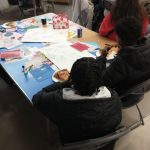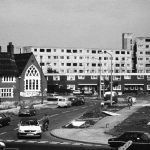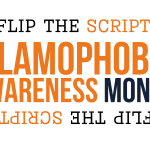Guest Blog by Suhaiymah Manzoor-Khan
Part 3: Challenging Islamophobia
In the final part of our Understanding Islamophobia blog series, Suhaiymah reflects on insights from one of our AIU RACE Centre collections. This blog considers what we can learn from previous strategies to challenge Islamophobia.
North West Islamic Media Forum Collection (Collection reference: GB3228.100)
The AIU RACE Centre had a collection donated from the North West Islamic Media Forum (NWIMF) which existed between 2006-2015. The collection includes meeting minutes, agendas, letters and notes of the forum. It was donated by its secretary, Wilfred Darlington, who worked at the BBC for 30 years.
Darlington played an important role in writing down what was discussed in the meetings of the group. From these documents we can learn that the NWIMF was proposed by the BBC to bring together Muslim individuals working in the media. The forum aimed to improve BBC services for Muslims in the North West, gather knowledge and “encourage more involvement of Muslims in the media”.
In the first meeting minutes of the forum on 19 December 2006, the secretary Darlington wrote that:
“The forum turned to a constant matter of concern; the lack of positive Islamic stories in the mainstream media. The view was taken that whereas an atrocity is likely to encourage broadcasters to seek condemnation from the Islamic community, the coverage of commonplace, positive Islamic stories is rare.”
Recent research on negative stories disproportionately outweighing positive ones can be found here.
In response, the forum suggested TV programmes that would demonstrate “cultural diversity”, training media-competent Muslim contributors and “mandatory training” for journalists about Islamic matters. The documentation of such suggestions from the NWIMF demonstrates that lack of positive representation of Muslims was seen as a major issue. Solutions were focused on more positive content and training both journalists and contributors.
Closure of the NWIMF
When we look at why the forum closed, we see the answer to some of the issues underpinning its very existence. The NWIMF closed down after Brexit in 2016. In the words of Wilfred Darlington, interviewed in January 2020, the forum closed down due to a changed “perception of the problem”. The archive records him saying:
“… after the referendum of 2016 we came to the conclusion that it wasn’t ignorance; that tabloid news editors were deliberately making outrageous comments about Islam – not just Islam and Muslims but any minorities – because it sold newspapers… [this] made us realise that the kind of agenda that we’d had for more than 10 years – probably 12 years – was probably slightly off-piste, and for that reason we really haven’t met.”
Taking on board Darlington’s reflections, it is clear that the focus of the NWIMF had been misguided. Islamophobic stories were told by the media not because of ignorance or lack of positive stories, but because of profit. In fact, the only formal way of countering media misrepresentation is through the Press Complaints Commission which is itself made up of media editors and financed by the newspaper industry. This makes it, in academic Julian Petley’s words:
“… hopeless as a bulwark against negative representations of Muslims and Islam in the press. Since it is paid for by newspapers, and its Code Committee is stuffed with editors, some of whose papers are front runners in the Islamophobia stakes.”
Read more about Miqdaad Versi’s experience of reporting media Islamophobia with the Independent Press Standards Organisation (IPSO) here.
Root causes and strategies for change
This brings us back to the point of root causes, as considered in part 2 of this blog series. The NWIMF ended up reacting to negative stories about Muslims and pleading with journalists for better representation. If the NWIMF had considered the root cause of media Islamophobia, what might they have spent ten years focusing their energy on? What change might they have been able to create?
One of the benefits of looking back at the AIU RACE Centre’s archives is that we can consider the strategies taken in the past to tackle racism. We can ask each other, what worked? What didn’t? How could this information shape action we want to take in the here and now?
Written by Suhaiymah Manzoor Khan; writer, poet, playwright and public educator
Find out more about our collections
If you would like to view North West Islamic Media Forum Collection (Collection reference: GB3228.100) or any of our other archive collections, please contact us. You can find out more information about how to book in to see our archives here.





